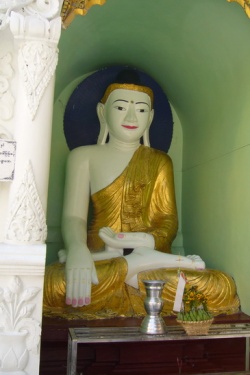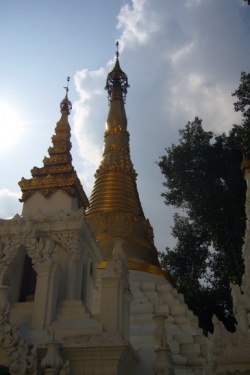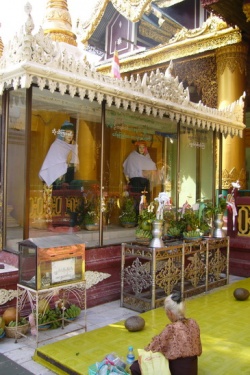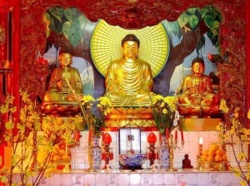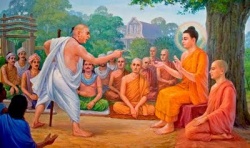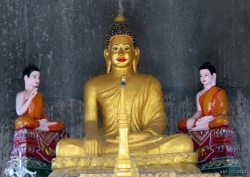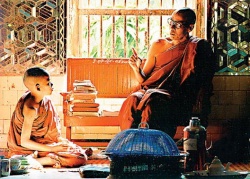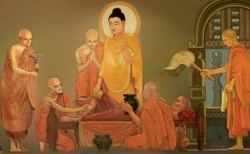Difference between revisions of "The Path to Buddhaship"
| Line 1: | Line 1: | ||
[[File:P1080254.JPG|thumb|250px|]] | [[File:P1080254.JPG|thumb|250px|]] | ||
<poem> | <poem> | ||
| − | 1. Doctrine’s aspect | + | [[1]]. Doctrine’s aspect |
| − | To a Theravada Buddhist, our tenet was - “You and only you can create your kamma and that Gods play no part in your kamma.” Is this tenet applicable to Laities only or does it applicable all across the board – Bodhisatta’s, arahat-to-be, great disciples, chief disciples and eighty-four ordinary disciples and laities all alike? I will present the facts and you decide because you the readers have the intelligence to know the real truth. | + | To a [[Theravada]] [[Buddhist]], our tenet was - “You and only you can create your [[kamma]] and that [[Gods]] play no part in your [[kamma]].” Is this tenet applicable to Laities only or does it applicable all across the board – Bodhisatta’s, arahat-to-be, [[great disciples]], [[chief disciples]] and eighty-four [[ordinary disciples]] and laities all alike? I will present the facts and you decide because you the readers have the {{Wiki|intelligence}} [[to know]] the real [[truth]]. |
| − | In keeping with the doctrine I went through the life of the Gotama Buddha, Gautama Buddha or Sakyamuni Buddha. This historic Buddha appeared in Mezzima Desa, Jambudipa. Among all religions, the Buddhist religion is the only one that said God has no part to play in one’s liberation. Just as Lord Buddha said, Buddha’s doctrine is the only one that paves the way to Nibbana – stated in “Cula sihanada | + | In keeping with the [[doctrine]] I went through the [[life]] of the [[Gotama Buddha]], [[Gautama Buddha]] or [[Sakyamuni Buddha]]. This historic [[Buddha]] appeared in Mezzima Desa, [[Jambudipa]]. Among all [[religions]], the [[Buddhist]] [[religion]] is the only one that said [[God]] has no part to play in one’s [[liberation]]. Just as [[Lord]] [[Buddha]] said, [[Buddha’s]] [[doctrine]] is the only one that paves the way to [[Nibbana]] – stated in “Cula sihanada [[sutta]]” and “Mahasihanada [[Sutta]].” |
| − | 2. Bodhisatta as Tusita God. | + | 2. [[Bodhisatta]] as [[Tusita]] [[God]]. |
| − | In his existence as Vessantara, he had given almost everything to charity; he even gave his wife and children to the Brahmin who begs for them. Sakka the king of Gods came to help fulfil his last and final perfection – perfection of charity. He then was reborn as God in Tusita heaven to wake for the opportune time to descend to the human world to seek for enlightenment. | + | In his [[existence]] as Vessantara, he had given almost everything to charity; he even gave his wife and children to the [[Brahmin]] who begs for them. Sakka the [[king]] of [[Gods]] came to help fulfil his last and final [[perfection]] – [[perfection]] of charity. He then was [[reborn]] as [[God]] in [[Tusita heaven]] to wake for the [[opportune]] [[time]] to [[descend]] to the [[human world]] to seek for [[enlightenment]]. |
| − | To open the eyes of wisdom, we need to know the relevant worlds of Devas. Let us now look at only the relevant sensual worlds of Devas. | + | To open the [[eyes]] of [[wisdom]], we need [[to know]] the relevant [[worlds]] of [[Devas]]. Let us now look at only the relevant sensual [[worlds]] of [[Devas]]. |
| − | a. Tusita (Heaven of Delight): This is the heaven where our Bodhisatta was reborn as Tusita God after his last existence in the human world as Vessantara (Vessantara Jataka.) In Tusita heaven, Bodhisatta will wait for the opportune time to be reborn as a human being and become the next Buddha, Gotama Buddha. | + | a. [[Tusita]] ([[Heaven]] of [[Delight]]): This is the [[heaven]] where our [[Bodhisatta]] was [[reborn]] as [[Tusita]] [[God]] after his last [[existence]] in the [[human world]] as Vessantara (Vessantara [[Jataka]].) In [[Tusita heaven]], [[Bodhisatta]] will wait for the [[opportune]] [[time]] to be [[reborn]] as a [[human being]] and become the next [[Buddha]], [[Gotama Buddha]]. |
| − | b. Paranimmita-vasavati (Gods who control the creation of others): The highest of the six sensuous heavens is Paranimmita-vasavati, the realm of gods who bring under their sway things created by others. Incidentally, the god Mara, well known for opposing the Buddha and Arahants, lives in this realm. However, the ruler of this realm is a righteous king – the Vasavati Deva. Mara and his retinue reside in a separate corner of the realm like a rebel leader. | + | b. Paranimmita-vasavati ([[Gods]] who control the creation of others): The highest of the six [[sensuous]] [[heavens]] is Paranimmita-vasavati, the [[realm]] of [[gods]] who bring under their sway things created by others. Incidentally, the [[god]] [[Mara]], well known for opposing the [[Buddha]] and [[Arahants]], [[lives]] in this [[realm]]. However, the ruler of this [[realm]] is a [[righteous]] [[king]] – the Vasavati [[Deva]]. [[Mara]] and his retinue reside in a separate corner of the [[realm]] like a rebel leader. |
| − | c. Brahma world | + | c. [[Brahma world]] |
[[File:P1080249.JPG|thumb|250px|]] | [[File:P1080249.JPG|thumb|250px|]] | ||
| − | There are three Planes of the First Jhana: | + | There are three Planes of the [[First Jhana]]: |
• The lowest is called Brahma-parisajja or Brahma’s retinue; | • The lowest is called Brahma-parisajja or Brahma’s retinue; | ||
• The second is called Brahma-purohita or Brahma’s ministers; | • The second is called Brahma-purohita or Brahma’s ministers; | ||
| − | • The highest of these three planes is Maha-Brahma or Great Brahmas. | + | • The highest of these three planes is Maha-Brahma or Great [[Brahmas]]. |
| − | They are so called because they exceed others in happiness, beauty and lifespan on account of their superior mental development. Those who develop the first Jhana to a normal extent are born in the first plane; those who have develop to a medium degree are born in the second plane; while those who have perfect control of the first Jhana are born as Maha-brahmas. | + | They are so called because they exceed others in [[happiness]], beauty and lifespan on account of their superior [[mental]] development. Those who develop the first [[Jhana]] to a normal extent are born in the first plane; those who have develop to a medium degree are born in the second plane; while those who have perfect control of the first [[Jhana]] are born as [[Maha-brahmas]]. |
| − | The powers of Buddha’s prophesy. | + | The [[powers]] of [[Buddha’s]] [[prophesy]]. |
| − | According to Pali Canon, because of the power of Omniscience acquired by the Supreme Buddha, the Buddha’s prophecy once spoken by the supreme Buddha, Dipankara Buddha means: Sumedha would definitely become a Buddha in Bhadra Kalpa as Gotama Buddha. By Buddha prophecy, as far as Sumedha is concerned he would definitely become a Buddha and at every existence when he meets with another Buddha, he must renew and reaffirm his aspiration before the Buddha of that era and there were 23 of them, until the arrival of his era – in Bhadra Kalpa, after Kassapa Buddha he would attain his Buddhaship as Gotama Buddha. | + | According to [[Pali Canon]], because of the [[power]] of [[Omniscience]] acquired by the [[Supreme Buddha]], the [[Buddha’s]] [[prophecy]] once spoken by the supreme [[Buddha]], [[Dipankara]] [[Buddha]] means: [[Sumedha]] would definitely become a [[Buddha]] in [[Bhadra Kalpa]] as [[Gotama Buddha]]. By [[Buddha]] [[prophecy]], as far as [[Sumedha]] is concerned he would definitely become a [[Buddha]] and at every [[existence]] when he meets with another [[Buddha]], he must renew and reaffirm his [[aspiration]] before the [[Buddha]] of that {{Wiki|era}} and there were 23 of them, until the arrival of his {{Wiki|era}} – in [[Bhadra Kalpa]], after [[Kassapa Buddha]] he would attain his [[Buddhaship]] as [[Gotama Buddha]]. |
| − | Bodhisatta, through countless world cycles and at every Buddha’s era, Gods were there to see to it that he is striving to fulfil his ten perfections. His kamma was sealed and cannot be changed. Gods must help him to fulfil the ten perfections. Buddha Dipankara saw his future and gave him a definite prophecy that sealed his kamma and Gods must see to it that he would attain Buddhaship. | + | [[Bodhisatta]], through countless [[world cycles]] and at every [[Buddha’s]] {{Wiki|era}}, [[Gods]] were there to see to it that he is striving to fulfil his [[ten perfections]]. His [[kamma]] was sealed and cannot be changed. [[Gods]] must help him to fulfil the [[ten perfections]]. [[Buddha]] [[Dipankara]] saw his future and gave him a definite [[prophecy]] that sealed his [[kamma]] and [[Gods]] must see to it that he would attain [[Buddhaship]]. |
| − | Sumedha’s kamma has been sealed and Supreme Buddha had ordered all Gods to see that Sumedha in all his existences should successfully fulfill his ten perfections and that no deviation is allowed. Does it means Gods play the role of executing the Supreme Buddha’s order or Gods are controlling Sumedha’s kamma until he attained the Buddhaship as Gotama Buddha? | + | Sumedha’s [[kamma]] has been sealed and [[Supreme Buddha]] had ordered all [[Gods]] to see that [[Sumedha]] in all his [[existences]] should successfully fulfill his [[ten perfections]] and that no deviation is allowed. Does it means [[Gods]] play the role of executing the Supreme [[Buddha’s]] [[order]] or [[Gods]] are controlling Sumedha’s [[kamma]] until he attained the [[Buddhaship]] as [[Gotama Buddha]]? |
[[File:P1080257.JPG|thumb|250px|]] | [[File:P1080257.JPG|thumb|250px|]] | ||
| − | Buddha’s tradition in Jambudipa | + | [[Buddha’s]] [[tradition]] in [[Jambudipa]] |
| − | On this planet earth, every Buddha that must appear in Jambudipa must follow one and only one tradition – the Buddha’s tradition. Once you aspired for Buddhaship and a Buddha had given a prophecy of affirmation, your kamma is sealed; because Gods would see to it that your goal come to fruition. Gods will protect you and see that your aspired kamma made before the Supreme Buddha be properly carried out by you or else Gods will see to it that you reach your goal post and that goal post should not move. | + | On this planet [[earth]], every [[Buddha]] that must appear in [[Jambudipa]] must follow one and only one [[tradition]] – the [[Buddha’s]] [[tradition]]. Once you aspired for [[Buddhaship]] and a [[Buddha]] had given a [[prophecy]] of affirmation, your [[kamma]] is sealed; because [[Gods]] would see to it that your goal come to [[fruition]]. [[Gods]] will protect you and see that your aspired [[kamma]] made before the [[Supreme Buddha]] be properly carried out by you or else [[Gods]] will see to it that you reach your goal post and that goal post should not move. |
| − | Bhadra Kalpa | + | [[Bhadra Kalpa]] |
| − | The present Kalpa is called Bhadra Kalpa where five Buddha’s will appear in succession – Kakusandha, Konâgamana, Kassapa and Gotama with one remaining to appear is Mettreyya. These teaching Buddha’s are called Supreme Buddha self-enlightened one. In every kalpa, where a Buddha must appear, Buddha will appear only in Jambudipa in Mezzima desa or Benares. At the same Benares location the next future Mettreyya Buddha’s era it will be named as | + | The present [[Kalpa]] is called [[Bhadra Kalpa]] where five [[Buddha’s]] will appear in succession – [[Kakusandha]], Konâgamana, [[Kassapa]] and [[Gotama]] with one remaining to appear is Mettreyya. These [[teaching]] [[Buddha’s]] are called [[Supreme Buddha]] self-enlightened one. In every [[kalpa]], where a [[Buddha]] must appear, [[Buddha]] will appear only in [[Jambudipa]] in Mezzima desa or [[Benares]]. At the same [[Benares]] location the next future Mettreyya [[Buddha’s]] {{Wiki|era}} it will be named as “[[Ketumati]]”. This present Mezzima desa that is desolate now, in Mettreyya [[Buddha’s]] {{Wiki|era}} will be streamed with marvellous jewels and planted with wishing [[trees]] all over to feed [[people]]. |
| − | In this way, in countless kalpas, we will be seeing ten more future Buddha’s, as predicted by Gotama Buddha, in this order: Metteyya, Râma, Pasenadi Kosala, Bhibhû, Dîghasoni, Samkacca, Subha, Brahman Todeyya, Nâlâgiri, Palaleyya. | + | In this way, in countless [[kalpas]], we will be [[seeing]] ten more future [[Buddha’s]], as predicted by [[Gotama Buddha]], in this [[order]]: [[Metteyya]], Râma, [[Pasenadi]] [[Kosala]], Bhibhû, Dîghasoni, Samkacca, [[Subha]], [[Brahman]] [[Todeyya]], Nâlâgiri, Palaleyya. |
| − | Prince Siddhattha existence - Who sound the wake-up call? | + | {{Wiki|Prince}} [[Siddhattha]] [[existence]] - Who [[sound]] the wake-up call? |
[[File:00x224.jpg|thumb|250px|]] | [[File:00x224.jpg|thumb|250px|]] | ||
| − | In every step of the life of Bodhisatta, Gods had been planning, scheming and preparing when and what Bodhisatta should be doing. When they found that it was time for Bodhisatta to strive for enlightenment, they sounded the wake-up call in the heart of Bodhisatta. | + | In every step of the [[life]] of [[Bodhisatta]], [[Gods]] had been planning, scheming and preparing when and what [[Bodhisatta]] should be doing. When they found that it was [[time]] for [[Bodhisatta]] to strive for [[enlightenment]], they sounded the wake-up call in the [[heart]] of [[Bodhisatta]]. |
| − | + | “[[Siddhattha]] its [[time]] for [[enlightenment]]” | |
| − | Gods assembled and sounded the wake-up call: to awake Bodhisatta – | + | [[Gods]] assembled and sounded the wake-up call: [[to awake]] [[Bodhisatta]] – “[[Siddhattha]] – its [[time]] for [[enlightenment]]”. You cannot keep on enjoying the [[sense]] [[pleasure]]. It’s your wake up call. |
| − | • To excite Siddhattha, Gods manifested four symbols: the four divine messengers – aged, sick, dead and ascetic monk only for the prince and his charioteer, Channa to see. | + | • To excite [[Siddhattha]], [[Gods]] [[manifested]] four [[symbols]]: the four [[divine]] messengers – aged, sick, [[dead]] and [[ascetic]] [[monk]] only for the {{Wiki|prince}} and his charioteer, [[Channa]] to see. |
| − | • Once his consciousness was awaked, he has only to think of the great retirement and he cannot be drawn in the pleasure of senses among 10,000 beautiful women. | + | • Once his [[consciousness]] was awaked, he has only to think of the great retirement and he cannot be drawn in the [[pleasure]] of [[senses]] among 10,000 [[beautiful]] women. |
| − | • The seduction of 10,000 beauties had turned into loathsome things when Gods sounded the alarm clock – time for enlightenment. | + | • The seduction of 10,000 beauties had turned into loathsome things when [[Gods]] sounded the alarm clock – [[time]] for [[enlightenment]]. |
| − | • The city gate guardian angels opened the city gates for the prince to leave the tightly guarded city. | + | • The city gate guardian angels opened the city gates for the {{Wiki|prince}} to leave the tightly guarded city. |
| − | • The king of Gods, Sakka, sent in Vissakamma to anoint the prince with celestial garment. | + | • The [[king]] of [[Gods]], Sakka, sent in Vissakamma to anoint the {{Wiki|prince}} with [[celestial]] garment. |
| − | • Sixty thousand deities lit up the way by holding torches routing for the prince great retirement. | + | • Sixty thousand [[deities]] lit up the way by [[holding]] torches routing for the {{Wiki|prince}} great retirement. |
| − | • Sakka the king of Gods came to receive the prince’s hairs when he thrown it into the air. He enshrined them in Culamani Cetiya in Tavatimsa heaven. | + | • Sakka the [[king]] of [[Gods]] came to receive the prince’s hairs when he thrown it into the [[air]]. He enshrined them in Culamani [[Cetiya]] in [[Tavatimsa heaven]]. |
| − | • Maha Brahma Ghatîkâra came to offer the prince eight Monk’s requisites and took away his old clothing and enshrined them in Dussa Cetiya in Ekkanittha Brahma world (Pariboga cetiya) | + | • [[Maha Brahma]] Ghatîkâra came to offer the {{Wiki|prince}} eight Monk’s requisites and took away his old clothing and enshrined them in Dussa [[Cetiya]] in Ekkanittha [[Brahma world]] (Pariboga [[cetiya]]) |
[[File:Buddha 27.jpeg|thumb|250px|]] | [[File:Buddha 27.jpeg|thumb|250px|]] | ||
| − | The attainment of Buddhaship. | + | The [[attainment]] of [[Buddhaship]]. |
| − | It was the Buddha’s tradition the Pali canon said that to every Buddha just prior to going into 49 days fasting, a Brahmin lady must offer the Bodhisatta the nourishment to withstand the 49 days fasting – Jhanas absorption meditation. | + | It was the [[Buddha’s]] [[tradition]] the [[Pali canon]] said that to every [[Buddha]] just prior to going into 49 days [[fasting]], a [[Brahmin]] lady must offer the [[Bodhisatta]] the nourishment to withstand the 49 days [[fasting]] – [[Jhanas]] absorption [[meditation]]. |
| − | Lady Sujata preparing milk-rice for the tree God. | + | Lady [[Sujata]] preparing milk-rice for the [[tree]] [[God]]. |
| − | • Devas of the four kings, the guardian angels were there to help Lady Sujata prepare the milk. | + | • [[Devas]] of the [[four kings]], the guardian angels were there to help Lady [[Sujata]] prepare the milk. |
| − | • Sakka was there to see to it that the divine food be infused into the milk-rice. | + | • Sakka was there to see to it that the [[divine]] [[food]] be infused into the milk-rice. |
| − | • Maha Brahma was also there to see that the right food be given to Bodhisattha. | + | • [[Maha Brahma]] was also there to see that the right [[food]] be given to Bodhisattha. |
| − | • It so happened that Bodhisatta was at that moment resting under that very sal-tree. | + | • It so happened that [[Bodhisatta]] was at that moment resting under that very sal-tree. |
| − | • Bodhisatta took the rice milk before going into 49 days of fasting. | + | • [[Bodhisatta]] took the rice milk before going into 49 days of [[fasting]]. |
| − | • As Bodhisatta was seated in his throne of enlightenment God Mara came to attack Bodhisattha to test the strength of his ten perfections whether he has truly fulfilled his ten perfection | + | • As [[Bodhisatta]] was seated in his throne of [[enlightenment]] [[God]] [[Mara]] came to attack Bodhisattha to test the strength of his [[ten perfections]] whether he has truly fulfilled his [[ten perfection]] |
| − | • Bodhisatta defeated Mara’s army with the power of his fully completed ten perfections with the earth stand in witness. | + | • [[Bodhisatta]] defeated Mara’s {{Wiki|army}} with the [[power]] of his fully completed [[ten perfections]] with the [[earth]] stand in witness. |
| − | All the above had been choreographed by Gods. | + | All the above had been choreographed by [[Gods]]. |
[[File:Buddha Cambo.jpg|thumb|250px|]] | [[File:Buddha Cambo.jpg|thumb|250px|]] | ||
| − | Gods steered Sumedha’s kamma. | + | [[Gods]] steered Sumedha’s [[kamma]]. |
| − | Many after going through the above would be in dilemma what to say because we all had been indoctrinated by our preachers that interpreted the doctrine as “ Gods play no part in one’s | + | Many after going through the above would be in dilemma what to say because we all had been indoctrinated by our preachers that interpreted the [[doctrine]] as “ [[Gods]] play no part in one’s [[kamma]]”. |
| − | It seems that the law of Kamma has to be classified differently for different individuals. | + | It seems that the law of [[Kamma]] has to be classified differently for different {{Wiki|individuals}}. |
| − | Obviously, we have witnessed how Gods had been everywhere helping and facilitating for Bodhisatta to attain Buddhaship. Right from the beginning of Sumedha existence, our Bodhisatta had been put on a track set by his own Sumedha aspiration confirmed by Buddha Dipankara for Buddhaship and Gods then took over and ensured the fulfilment of ten perfections. | + | Obviously, we have witnessed how [[Gods]] had been everywhere helping and facilitating for [[Bodhisatta]] to attain [[Buddhaship]]. Right from the beginning of [[Sumedha]] [[existence]], our [[Bodhisatta]] had been put on a track set by his own [[Sumedha]] [[aspiration]] confirmed by [[Buddha]] [[Dipankara]] for [[Buddhaship]] and [[Gods]] then took over and ensured the fulfilment of [[ten perfections]]. |
| − | In his final existence as Prince Siddhattha, Gods in their assembly headed by Sakka sounded the wake-up call to the Prince saying: | + | In his final [[existence]] as {{Wiki|Prince}} [[Siddhattha]], [[Gods]] in their assembly headed by Sakka sounded the wake-up call to the {{Wiki|Prince}} saying: “[[Siddhattha]] – it’s [[time]] for [[enlightenment]]”. [[Thus]] we can say [[Gods]] play a major role in facilitating the Bodhisattha’s [[kamma]]. |
| − | Next let us look at Maha Maya ‘s kamma. | + | Next let us look at [[Maha Maya]] ‘s [[kamma]]. |
| − | In the era of Padumuttara Buddha, she had aspired to carry the future Buddha in her womb. Padumuttara Buddha prophesied that she would be a mother to Siddhattha in the Gotama Buddha’s era. So her aspiration come to fruition and Gods were also involved in planning Maha Maya to become the Queen of Suddhodana and our Bodhisatta rightly selected her to be his mother. Gods took her over to Anotatta Lake to cleanse her to carry Bodhisatta in her womb. Maha Maya’s kamma was also sealed the moment she aspired for Buddha’s mother before Padumuttara Buddha. | + | In the {{Wiki|era}} of [[Padumuttara Buddha]], she had aspired to carry the [[future Buddha]] in her [[womb]]. [[Padumuttara Buddha]] prophesied that she would be a mother to [[Siddhattha]] in the [[Gotama]] [[Buddha’s]] {{Wiki|era}}. So her [[aspiration]] come to [[fruition]] and [[Gods]] were also involved in planning [[Maha Maya]] to become the {{Wiki|Queen}} of [[Suddhodana]] and our [[Bodhisatta]] rightly selected her to be his mother. [[Gods]] took her over to Anotatta Lake to cleanse her to carry [[Bodhisatta]] in her [[womb]]. [[Maha]] Maya’s [[kamma]] was also sealed the moment she aspired for [[Buddha’s]] mother before [[Padumuttara Buddha]]. |
| − | Next, look at Rahula Mata (Yasodhaya Devi). | + | Next, look at [[Rahula]] Mata (Yasodhaya [[Devi]]). |
[[File:Buddha teaching254.jpg|thumb|250px|]] | [[File:Buddha teaching254.jpg|thumb|250px|]] | ||
| − | She was in the existence as Sumitta a water carrier girl who happened to have with her eight stalks of lotus flowers when Dipankara was on a visit to the Amara city. Sumedha was looking for flowers to offer to Buddha Dipankara. Sumedha seeing that Sumitta had eight stalks of lotus flowers, he bargained with her to part five stalks of lotus and by mutual agreement had a contract with Sumitta to part five stalks of lotus flowers in return for making her his eternal soul mate until he attained Buddhaship. Gods thus see to it that Sumitta be born at the same time as Siddhattha and the Prince Siddhattha married her at age 16. She bore him a son by the name of Rahula. Sumitta‘s kamma also was sealed the moment they both made their aspiration and received Dipankara’s Buddha’s prophesies. | + | She was in the [[existence]] as Sumitta a [[water]] carrier girl who happened to have with her eight stalks of [[lotus]] flowers when [[Dipankara]] was on a visit to the Amara city. [[Sumedha]] was looking for flowers to offer to [[Buddha]] [[Dipankara]]. [[Sumedha]] [[seeing]] that Sumitta had eight stalks of [[lotus]] flowers, he bargained with her to part five stalks of [[lotus]] and by mutual agreement had a contract with Sumitta to part five stalks of [[lotus]] flowers in return for making her his [[eternal]] [[soul]] mate until he attained [[Buddhaship]]. [[Gods]] thus see to it that Sumitta be born at the same [[time]] as [[Siddhattha]] and the {{Wiki|Prince}} [[Siddhattha]] married her at age 16. She bore him a son by the name of [[Rahula]]. Sumitta‘s [[kamma]] also was sealed the moment they both made their [[aspiration]] and received Dipankara’s [[Buddha’s]] prophesies. |
| − | Let us again look at Bahiya Thera (foremost in fastest learner) | + | Let us again look at [[Bahiya]] [[Thera]] ([[foremost]] in fastest learner) |
| − | Bahiya was a Brahmin holy man. One day during his sea voyage, his ship was wrecked and he was the only survival and stranded in a town where he was naked. He took on a bark as his garment and the town people took him as a miraculous holy man. In time, he also believed that he was an arahat. His friend from his past birth who had been born in the Brahma world in the interest of Bahiya came down to warn him of his wrong notion. For Bahiya to be able to have a dialogue with Brahma Bahiya must have acquired the divine eye and his spiritual level must be at an advance level. The Brahma friend thus directed him to see the Buddha who is the true arahat. Bahiya after he met the Buddha had learnt a short stanza and attained the arahatship. Buddha proclaimed him as the fastest learner among his arahat disciples. Anyone who has blood relatives in heaven would have an advantage because God would be watching for his interest. | + | [[Bahiya]] was a [[Brahmin]] holy man. One day during his sea voyage, his ship was wrecked and he was the only survival and stranded in a town where he was naked. He took on a bark as his garment and the town [[people]] took him as a miraculous holy man. In [[time]], he also believed that he was an [[arahat]]. His friend from his past [[birth]] who had been born in the [[Brahma world]] in the interest of [[Bahiya]] came down to warn him of his wrong notion. For [[Bahiya]] to be able to have a dialogue with [[Brahma]] [[Bahiya]] must have acquired the [[divine eye]] and his [[spiritual]] level must be at an advance level. The [[Brahma]] friend thus directed him to see the [[Buddha]] who is the true [[arahat]]. [[Bahiya]] after he met the [[Buddha]] had learnt a short [[stanza]] and attained the [[arahatship]]. [[Buddha]] proclaimed him as the fastest learner among his [[arahat]] [[disciples]]. Anyone who has blood relatives in [[heaven]] would have an advantage because [[God]] would be watching for his interest. |
Conclusions: | Conclusions: | ||
| − | There are four kinds of individuals: | + | There are four kinds of {{Wiki|individuals}}: |
| − | a. One who has met the Supreme Buddha in person and had made an aspiration either to become an arahat, to become a great Buddha disciple, to become related to the future Buddha as his ordinary disciple or as an associates. (Here, only the natives of Jambudipa would have this opportunity) | + | a. One who has met the [[Supreme Buddha]] in [[person]] and had made an [[aspiration]] either to become an [[arahat]], to become a great [[Buddha]] [[disciple]], to become related to the [[future Buddha]] as his [[ordinary disciple]] or as an associates. (Here, only the natives of [[Jambudipa]] would have this opportunity) |
[[File:Buddha-11-748b7.jpg|thumb|250px|]] | [[File:Buddha-11-748b7.jpg|thumb|250px|]] | ||
| − | b. One who has friends or blood relatives in heaven who will watch for his interest. | + | b. One who has friends or blood relatives in [[heaven]] who will watch for his interest. |
| − | c. One who has a mother from his past births who is a Goddess in heaven. Some called it Guardian angels. | + | c. One who has a mother from his past [[births]] who is a [[Goddess]] in [[heaven]]. Some called it Guardian angels. |
d. One who has none of the above. | d. One who has none of the above. | ||
| − | a. One who has made aspiration before the Supreme Buddha in person and received confirmation of his aspiration. For this individual his kamma is sealed and Gods are being assigned to see to it that his aspiration be fulfilled and come to fruition in timely way. Examples - Our Bhodhisatta; Sumitta or Yasodara Devi; or MahaMaya the Buddha’s mother. Their kamma are sealed in time capsule until it comes to fruition. | + | a. One who has made [[aspiration]] before the [[Supreme Buddha]] in [[person]] and received confirmation of his [[aspiration]]. For this {{Wiki|individual}} his [[kamma]] is sealed and [[Gods]] are [[being]] assigned to see to it that his [[aspiration]] be fulfilled and come to [[fruition]] in timely way. Examples - Our Bhodhisatta; Sumitta or Yasodara [[Devi]]; or MahaMaya the [[Buddha’s]] mother. Their [[kamma]] are sealed in [[time]] capsule until it comes to [[fruition]]. |
| − | b. One who has blood relatives in heaven. Examples - Bahiya Thera; Saputta and Bhallika the two Brahmin merchant brothers. Good friends are hard to come by and if you have one, you can hold on to his coattail. | + | b. One who has blood relatives in [[heaven]]. Examples - [[Bahiya]] [[Thera]]; Saputta and Bhallika the two [[Brahmin]] {{Wiki|merchant}} brothers. Good friends are hard to come by and if you have one, you can hold on to his coattail. |
| − | c. One who has a Godmother in heaven. Examples - MahaMaya when she was reborn as Tusita God, he came down to encourage Bodhisatta when he got fainted due to extreme austerities practice; Saputta and Bhallika their mother directed the two brothers to see the Buddha and to give alms to the Buddha. Buddha’s foremost lay disciples – one attained Arahatship and the younger one attained Sotapanna. A mother in heaven is like having a guarantor to help you out in times of need. | + | c. One who has a Godmother in [[heaven]]. Examples - MahaMaya when she was [[reborn]] as [[Tusita]] [[God]], he came down to encourage [[Bodhisatta]] when he got fainted due to extreme austerities practice; Saputta and Bhallika their mother directed the two brothers to see the [[Buddha]] and to give [[alms]] to the [[Buddha]]. [[Buddha’s]] [[foremost]] lay [[disciples]] – one attained [[Arahatship]] and the younger one attained [[Sotapanna]]. A mother in [[heaven]] is like having a guarantor to help you out in times of need. |
| − | d. One who has no relations in the world of Gods. Its just too bad, you are on your own. You have to create your own kamma and steer your own destiny. You may never see the light and never come to the right view. This is called Loka Dhamma, (In Burmese is Loka dan taya). In other words, he belongs to bad lineage. He is indeed an orphan in this Samsara. | + | d. One who has no relations in the [[world]] of [[Gods]]. Its just too bad, you are on your own. You have to create your own [[kamma]] and steer your own [[destiny]]. You may never see the [[light]] and never come to the [[right view]]. This is called [[Loka]] [[Dhamma]], (In [[Burmese]] is [[Loka]] dan taya). In other words, he belongs to bad [[lineage]]. He is indeed an orphan in this [[Samsara]]. |
| − | This is the nature of life living in this samsara that is the law of the land – the Samsara – the cycle of life in this planet earth. The only ways for this person to see the right view is by association with good friends and go up step-by-step to a better life. | + | This is the [[nature]] of [[life]] living in this [[samsara]] that is the law of the land – the [[Samsara]] – the cycle of [[life]] in this planet [[earth]]. The only ways for this [[person]] to see the [[right view]] is by association with good friends and go up step-by-step to a better [[life]]. |
| − | To this person, the law of kamma – will apply very clearly. He will have to enjoy or suffer the result of his action and the destiny of his bad lineage he inherited. | + | To this [[person]], the law of [[kamma]] – will apply very clearly. He will have to enjoy or [[suffer]] the [[result]] of his [[action]] and the [[destiny]] of his bad [[lineage]] he inherited. |
</poem> | </poem> | ||
{{R}} | {{R}} | ||
Revision as of 17:07, 3 September 2013
1. Doctrine’s aspect
To a Theravada Buddhist, our tenet was - “You and only you can create your kamma and that Gods play no part in your kamma.” Is this tenet applicable to Laities only or does it applicable all across the board – Bodhisatta’s, arahat-to-be, great disciples, chief disciples and eighty-four ordinary disciples and laities all alike? I will present the facts and you decide because you the readers have the intelligence to know the real truth.
In keeping with the doctrine I went through the life of the Gotama Buddha, Gautama Buddha or Sakyamuni Buddha. This historic Buddha appeared in Mezzima Desa, Jambudipa. Among all religions, the Buddhist religion is the only one that said God has no part to play in one’s liberation. Just as Lord Buddha said, Buddha’s doctrine is the only one that paves the way to Nibbana – stated in “Cula sihanada sutta” and “Mahasihanada Sutta.”
2. Bodhisatta as Tusita God.
In his existence as Vessantara, he had given almost everything to charity; he even gave his wife and children to the Brahmin who begs for them. Sakka the king of Gods came to help fulfil his last and final perfection – perfection of charity. He then was reborn as God in Tusita heaven to wake for the opportune time to descend to the human world to seek for enlightenment.
To open the eyes of wisdom, we need to know the relevant worlds of Devas. Let us now look at only the relevant sensual worlds of Devas.
a. Tusita (Heaven of Delight): This is the heaven where our Bodhisatta was reborn as Tusita God after his last existence in the human world as Vessantara (Vessantara Jataka.) In Tusita heaven, Bodhisatta will wait for the opportune time to be reborn as a human being and become the next Buddha, Gotama Buddha.
b. Paranimmita-vasavati (Gods who control the creation of others): The highest of the six sensuous heavens is Paranimmita-vasavati, the realm of gods who bring under their sway things created by others. Incidentally, the god Mara, well known for opposing the Buddha and Arahants, lives in this realm. However, the ruler of this realm is a righteous king – the Vasavati Deva. Mara and his retinue reside in a separate corner of the realm like a rebel leader.
c. Brahma world
There are three Planes of the First Jhana:
• The lowest is called Brahma-parisajja or Brahma’s retinue;
• The second is called Brahma-purohita or Brahma’s ministers;
• The highest of these three planes is Maha-Brahma or Great Brahmas.
They are so called because they exceed others in happiness, beauty and lifespan on account of their superior mental development. Those who develop the first Jhana to a normal extent are born in the first plane; those who have develop to a medium degree are born in the second plane; while those who have perfect control of the first Jhana are born as Maha-brahmas.
The powers of Buddha’s prophesy.
According to Pali Canon, because of the power of Omniscience acquired by the Supreme Buddha, the Buddha’s prophecy once spoken by the supreme Buddha, Dipankara Buddha means: Sumedha would definitely become a Buddha in Bhadra Kalpa as Gotama Buddha. By Buddha prophecy, as far as Sumedha is concerned he would definitely become a Buddha and at every existence when he meets with another Buddha, he must renew and reaffirm his aspiration before the Buddha of that era and there were 23 of them, until the arrival of his era – in Bhadra Kalpa, after Kassapa Buddha he would attain his Buddhaship as Gotama Buddha.
Bodhisatta, through countless world cycles and at every Buddha’s era, Gods were there to see to it that he is striving to fulfil his ten perfections. His kamma was sealed and cannot be changed. Gods must help him to fulfil the ten perfections. Buddha Dipankara saw his future and gave him a definite prophecy that sealed his kamma and Gods must see to it that he would attain Buddhaship.
Sumedha’s kamma has been sealed and Supreme Buddha had ordered all Gods to see that Sumedha in all his existences should successfully fulfill his ten perfections and that no deviation is allowed. Does it means Gods play the role of executing the Supreme Buddha’s order or Gods are controlling Sumedha’s kamma until he attained the Buddhaship as Gotama Buddha?
Buddha’s tradition in Jambudipa
On this planet earth, every Buddha that must appear in Jambudipa must follow one and only one tradition – the Buddha’s tradition. Once you aspired for Buddhaship and a Buddha had given a prophecy of affirmation, your kamma is sealed; because Gods would see to it that your goal come to fruition. Gods will protect you and see that your aspired kamma made before the Supreme Buddha be properly carried out by you or else Gods will see to it that you reach your goal post and that goal post should not move.
Bhadra Kalpa
The present Kalpa is called Bhadra Kalpa where five Buddha’s will appear in succession – Kakusandha, Konâgamana, Kassapa and Gotama with one remaining to appear is Mettreyya. These teaching Buddha’s are called Supreme Buddha self-enlightened one. In every kalpa, where a Buddha must appear, Buddha will appear only in Jambudipa in Mezzima desa or Benares. At the same Benares location the next future Mettreyya Buddha’s era it will be named as “Ketumati”. This present Mezzima desa that is desolate now, in Mettreyya Buddha’s era will be streamed with marvellous jewels and planted with wishing trees all over to feed people.
In this way, in countless kalpas, we will be seeing ten more future Buddha’s, as predicted by Gotama Buddha, in this order: Metteyya, Râma, Pasenadi Kosala, Bhibhû, Dîghasoni, Samkacca, Subha, Brahman Todeyya, Nâlâgiri, Palaleyya.
Prince Siddhattha existence - Who sound the wake-up call?
In every step of the life of Bodhisatta, Gods had been planning, scheming and preparing when and what Bodhisatta should be doing. When they found that it was time for Bodhisatta to strive for enlightenment, they sounded the wake-up call in the heart of Bodhisatta.
“Siddhattha its time for enlightenment”
Gods assembled and sounded the wake-up call: to awake Bodhisatta – “Siddhattha – its time for enlightenment”. You cannot keep on enjoying the sense pleasure. It’s your wake up call.
• To excite Siddhattha, Gods manifested four symbols: the four divine messengers – aged, sick, dead and ascetic monk only for the prince and his charioteer, Channa to see.
• Once his consciousness was awaked, he has only to think of the great retirement and he cannot be drawn in the pleasure of senses among 10,000 beautiful women.
• The seduction of 10,000 beauties had turned into loathsome things when Gods sounded the alarm clock – time for enlightenment.
• The city gate guardian angels opened the city gates for the prince to leave the tightly guarded city.
• The king of Gods, Sakka, sent in Vissakamma to anoint the prince with celestial garment.
• Sixty thousand deities lit up the way by holding torches routing for the prince great retirement.
• Sakka the king of Gods came to receive the prince’s hairs when he thrown it into the air. He enshrined them in Culamani Cetiya in Tavatimsa heaven.
• Maha Brahma Ghatîkâra came to offer the prince eight Monk’s requisites and took away his old clothing and enshrined them in Dussa Cetiya in Ekkanittha Brahma world (Pariboga cetiya)
The attainment of Buddhaship.
It was the Buddha’s tradition the Pali canon said that to every Buddha just prior to going into 49 days fasting, a Brahmin lady must offer the Bodhisatta the nourishment to withstand the 49 days fasting – Jhanas absorption meditation.
Lady Sujata preparing milk-rice for the tree God.
• Devas of the four kings, the guardian angels were there to help Lady Sujata prepare the milk.
• Sakka was there to see to it that the divine food be infused into the milk-rice.
• Maha Brahma was also there to see that the right food be given to Bodhisattha.
• It so happened that Bodhisatta was at that moment resting under that very sal-tree.
• Bodhisatta took the rice milk before going into 49 days of fasting.
• As Bodhisatta was seated in his throne of enlightenment God Mara came to attack Bodhisattha to test the strength of his ten perfections whether he has truly fulfilled his ten perfection
• Bodhisatta defeated Mara’s army with the power of his fully completed ten perfections with the earth stand in witness.
All the above had been choreographed by Gods.
Gods steered Sumedha’s kamma.
Many after going through the above would be in dilemma what to say because we all had been indoctrinated by our preachers that interpreted the doctrine as “ Gods play no part in one’s kamma”.
It seems that the law of Kamma has to be classified differently for different individuals.
Obviously, we have witnessed how Gods had been everywhere helping and facilitating for Bodhisatta to attain Buddhaship. Right from the beginning of Sumedha existence, our Bodhisatta had been put on a track set by his own Sumedha aspiration confirmed by Buddha Dipankara for Buddhaship and Gods then took over and ensured the fulfilment of ten perfections.
In his final existence as Prince Siddhattha, Gods in their assembly headed by Sakka sounded the wake-up call to the Prince saying: “Siddhattha – it’s time for enlightenment”. Thus we can say Gods play a major role in facilitating the Bodhisattha’s kamma.
Next let us look at Maha Maya ‘s kamma.
In the era of Padumuttara Buddha, she had aspired to carry the future Buddha in her womb. Padumuttara Buddha prophesied that she would be a mother to Siddhattha in the Gotama Buddha’s era. So her aspiration come to fruition and Gods were also involved in planning Maha Maya to become the Queen of Suddhodana and our Bodhisatta rightly selected her to be his mother. Gods took her over to Anotatta Lake to cleanse her to carry Bodhisatta in her womb. Maha Maya’s kamma was also sealed the moment she aspired for Buddha’s mother before Padumuttara Buddha.
Next, look at Rahula Mata (Yasodhaya Devi).
She was in the existence as Sumitta a water carrier girl who happened to have with her eight stalks of lotus flowers when Dipankara was on a visit to the Amara city. Sumedha was looking for flowers to offer to Buddha Dipankara. Sumedha seeing that Sumitta had eight stalks of lotus flowers, he bargained with her to part five stalks of lotus and by mutual agreement had a contract with Sumitta to part five stalks of lotus flowers in return for making her his eternal soul mate until he attained Buddhaship. Gods thus see to it that Sumitta be born at the same time as Siddhattha and the Prince Siddhattha married her at age 16. She bore him a son by the name of Rahula. Sumitta‘s kamma also was sealed the moment they both made their aspiration and received Dipankara’s Buddha’s prophesies.
Let us again look at Bahiya Thera (foremost in fastest learner)
Bahiya was a Brahmin holy man. One day during his sea voyage, his ship was wrecked and he was the only survival and stranded in a town where he was naked. He took on a bark as his garment and the town people took him as a miraculous holy man. In time, he also believed that he was an arahat. His friend from his past birth who had been born in the Brahma world in the interest of Bahiya came down to warn him of his wrong notion. For Bahiya to be able to have a dialogue with Brahma Bahiya must have acquired the divine eye and his spiritual level must be at an advance level. The Brahma friend thus directed him to see the Buddha who is the true arahat. Bahiya after he met the Buddha had learnt a short stanza and attained the arahatship. Buddha proclaimed him as the fastest learner among his arahat disciples. Anyone who has blood relatives in heaven would have an advantage because God would be watching for his interest.
Conclusions:
There are four kinds of individuals:
a. One who has met the Supreme Buddha in person and had made an aspiration either to become an arahat, to become a great Buddha disciple, to become related to the future Buddha as his ordinary disciple or as an associates. (Here, only the natives of Jambudipa would have this opportunity)
b. One who has friends or blood relatives in heaven who will watch for his interest.
c. One who has a mother from his past births who is a Goddess in heaven. Some called it Guardian angels.
d. One who has none of the above.
a. One who has made aspiration before the Supreme Buddha in person and received confirmation of his aspiration. For this individual his kamma is sealed and Gods are being assigned to see to it that his aspiration be fulfilled and come to fruition in timely way. Examples - Our Bhodhisatta; Sumitta or Yasodara Devi; or MahaMaya the Buddha’s mother. Their kamma are sealed in time capsule until it comes to fruition.
b. One who has blood relatives in heaven. Examples - Bahiya Thera; Saputta and Bhallika the two Brahmin merchant brothers. Good friends are hard to come by and if you have one, you can hold on to his coattail.
c. One who has a Godmother in heaven. Examples - MahaMaya when she was reborn as Tusita God, he came down to encourage Bodhisatta when he got fainted due to extreme austerities practice; Saputta and Bhallika their mother directed the two brothers to see the Buddha and to give alms to the Buddha. Buddha’s foremost lay disciples – one attained Arahatship and the younger one attained Sotapanna. A mother in heaven is like having a guarantor to help you out in times of need.
d. One who has no relations in the world of Gods. Its just too bad, you are on your own. You have to create your own kamma and steer your own destiny. You may never see the light and never come to the right view. This is called Loka Dhamma, (In Burmese is Loka dan taya). In other words, he belongs to bad lineage. He is indeed an orphan in this Samsara.
This is the nature of life living in this samsara that is the law of the land – the Samsara – the cycle of life in this planet earth. The only ways for this person to see the right view is by association with good friends and go up step-by-step to a better life.
To this person, the law of kamma – will apply very clearly. He will have to enjoy or suffer the result of his action and the destiny of his bad lineage he inherited.
